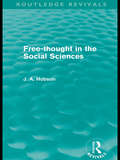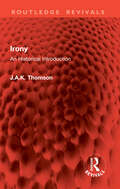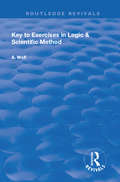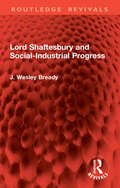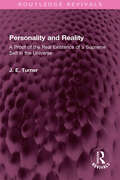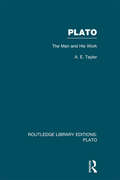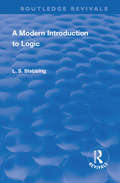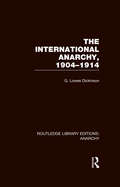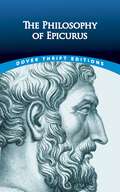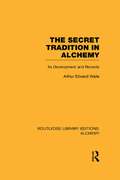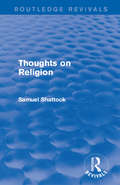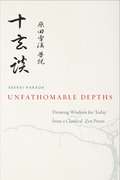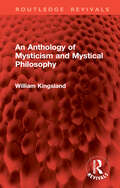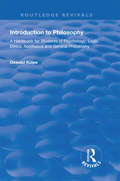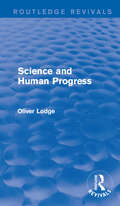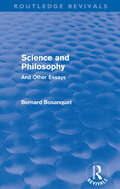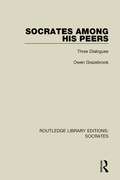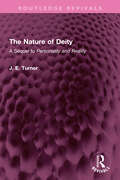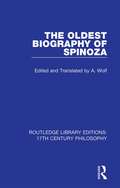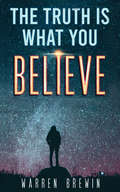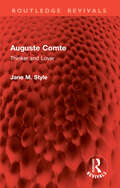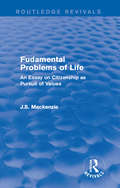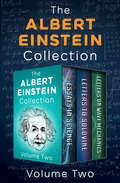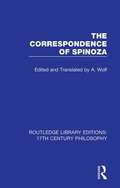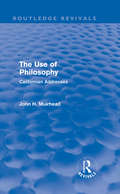- Table View
- List View
Free-Thought in the Social Sciences (Routledge Revivals)
by J. A. HobsonThis Routledge Revival sees the reissue of a seminal work by British economist, sociologist and academic John A. Hobson, elucidating his views on a variety of topics across the social sciences. He makes particular reference to the struggle between the disinterested urge of the social scientist and the interests and other motive forces which tend to influence and mould his processes of inquiry. The work is split into three parts, focussing upon free-thinking, economics and political ethics respectively.
Irony: An Historical Introduction (Routledge Revivals)
by J.A.K. ThomsonIrony, with its old and complex history beginning with Plato and Socrates, and known by intellects from different social classes, including the ancient dramatists, philosophers, and rhetoricians, is not an easy concept to grasp. Originally published in 1926, this volume analyses the history of irony in ancient writers such as Homer and Lucian and how the use of Irony in modern literature has been shaped and coloured by the Ironical tradition. The works of Tacitus, Shakespeare, Goethe and Jane Austen are among those discussed.
Key to Exercises in Logic and Scientific Method (Routledge Revivals)
by A. WolfOriginally published in 1926, this book was written in the first instance for the benefit of those students of Logic and Scientific Method who receive insufficient or no help in the way of oral instruction. The main function of the following pages is to deal with the exercises, as distinguished from the book-questions. It includes chapters on the scope of logic, theory of judgment and immediate inference, and theory of induction.
Lord Shaftesbury and Social-Industrial Progress (Routledge Revivals)
by J. Wesley BreadyOriginally published in 1926, this volume is much more than a biography of an outstanding politician, social reformer and philosopher. It provides an analysis of the history of social conditions in England during the nineteenth century, as well as a discussion of the development of social affairs and the inertia of political psychology. The role that faith and religion played in motivating Lord Shaftesbury’s desire for social reform is also discussed as is the ways in which he and John Wesley transformed the social and ethical ideas of England to enshrine in law many of the working conditions that we take for granted today such as defined hours of work and rest periods.
Personality and Reality: A Proof of the Real Existence of a Supreme Self in the Universe (Routledge Revivals)
by J. E. TurnerFirst published in 1926, Personality and Reality is the analysis of the place and function of mind and God. The author argues that the conception of a supreme Self is required for the interpretation of the Universe, just like the requirement of the system of space and time; and that both conceptions are established by necessities. This book will be of interest to students of philosophy, religion, literature and science.
Plato: The Man And His Work (Routledge Library Editions: Plato)
by A.E. TaylorThis book provides an introduction to Plato’s work that gives a clear statement of what Plato has to say about the problems of thought and life. In particular, it tells the reader just what Plato says, and makes no attempt to force a system on the Platonic text or to trim Plato’s works to suit contemporary philosophical tastes. The author also gives an account that has historical fidelity - we cannot really understand the Republic or the Gorgias if we forget that the Athens of the conversations is meant to be the Athens of Nicias or Cleon, not the very different Athens of Plato’s own manhood. To understand Plato’s thought we must see it in the right historical perspective.
Revival: A Modern Introduction to Logic (Routledge Revivals)
by Lizzie Susan StebbingAs the author of this volume states, "the science of logic does not stand still." This book was intended to cover the advances made in the study of logic in the first half of the nineteenth century, during which time the author felt there to have been greater advances made than in the whole of the preceding period from the time of Aristotle. Advances which, in her eyes, were not present in contemporary text books. As such, this book offers a valuable insight into the progress of the subject, tracing this frenetic period in its development with a first-hand awareness of its documentary value.
The International Anarchy (Routledge Library Editions: Anarchy)
by G. Lowes DickinsonThis volume, a classic of its time, discusses the tragic evolution of European politics from 1870-1914. The main part of the book describes the development of the relations between France, Germany, Russia and Britain and follows the sequence of political events, the Triple Alliance and Bismarck's secret treaties, the Triple Entente, Morocco and the Conference of Algeciras, The Annexation of Bosnia, Agadir, Tripoli, the Bagdad Railway, Persia, the Far East, the Balkan Wars. Its value remains because while other books deal with the actions of individuals, this volume indicates the underlying forces of which they were the victims.
The Philosophy of Epicurus: Letters, Doctrines, And Parallel Passages From Lucretius (Dover Thrift Editions)
by EpicurusDespite its modern-day connotations of hedonism, "Epicureanism" has more to do with living a mindful, uncomplicated life. Epicurus — who was born at Samos, Greece, in 341 BC and died at Athens in 270 BC — founded a school of philosophy that focused on maximizing simple pleasures and minimizing pain, such as the irrational fear of death. "Death is nothing to us," declared Epicurus, "since when we are, death has not come, and when death has come, we are not." The philosopher did not believe that humans would be punished for their sins after death, and he stressed the lifelong search for lasting pleasures: tranquility, friendship, and philosophical inquiry. Although Epicurus was a prolific author, very few of his writings have survived. This volume, edited and translated by George K. Strodach, features three important letters and a collection of observations preserved by the biographer of ancient philosophers, Diogenes Laertius. Students of philosophy and ancient history will appreciate this compilation of Epicurus's enduring wisdom.
The Secret Tradition in Alchemy: Its Development and Records (Routledge Library Editions: Alchemy)
by Arthur Edward WaiteA complete history of alchemy revealing the subject as much more than the attempts in early science of turning base metals into gold or silver, this book goes about intimating the mystical experience underlying hermetic symbolism. It outlines some of the ‘secret’ inner meanings to alchemy - symbolism, metaphysics, and spirituality. This book contains a universe of information and is worthwhile reading for anyone wanting to know more on this engaging subject. Originally published in 1926.
Thoughts on Religion (Routledge Revivals)
by Samuel ShattockThis book, first published in 1926, is a collection of the original thoughts of Samuel George Shattock on religious matters. Shattock recorded his thoughts on religion throughout his life. This title brings together what Shattock himself felt to be his most important ideas on theology. Thoughts on Religion will be of interest to students of religion and philosophy.
Unfathomable Depths
by Daigaku Rumme Sekkei Harada Hongliang Gu Heiko NarrogNavigate a forgotten classic poem and enrich your practice with famed Zen master Sekkei Harada.Three of the most pressing issues in any discussion of modern Zen are the true nature and function of Dharma transmission, how to appropriately practice with koans, and how to understand the "just sitting" of Soto Zen. Zen master Sekkei Harada uses the enigmatic "Ten Verses of Unfathomable Depth" as the basis of his practical and theoretical discussion of these concerns. Unfathomable Depths presents a concise treatment of Soto theory and practice, while delivering approachable and workable advice from one of Zen's most esteemed teachers. Rooting himself in Tong'an Changcha's classical poem, Harada intimately speaks to the world of Zen today.
An Anthology of Mysticism and Mystical Philosophy (Routledge Revivals)
by William KingslandFirst published in 1927, An Anthology of Mysticism and Mystical Philosophy is a valuable contribution to the literature of mysticism in general, both in its theoretical and experimental aspects. It contains over seven hundred and fifty quotations from one hundred and fifty-eight ancient and modern mystical, philosophical, and scientific works. This book also acts as a supplement to William Kingsland’s previous volume Rational Mysticism for it is illustrative of the principles therein set forth.
Introduction to Philosophy: A Handbook for Students of Psychology, Logic, Ethics, Aesthetics and General Philosophy (Routledge Revivals)
by Oswald KülpeFirst published in 1927, this translation of Kulpe’s ‘Einleitung in die Philosophie’, 1895, covered psychology, logic, ethics, esthetics and general philosophy. The author adopted a uniform approach of positivity, interest and impartiality, aiming his work at a wider public than students of philosophy. The volume was intended as an elementary but complete guide to philosophy, past and present and included facts and arguments previously confined to philosophical encyclopaedias.
Science and Human Progress (Routledge Revivals)
by Oliver Sir LodgeOriginally delivered as a series of lectures for the Halley Stewart trust in 1926, Lodge’s work was collected and first published in 1927. Lodge uses his scientific training to inquire into such general issues as religion, human progress, and societal advances with an aim to better understand the physical order of the universe. This title will be of interest to students of philosophy, particularly those interested in the development of early twentieth century thought.
Science and Philosophy: And Other Essays (Routledge Revivals)
by Bernard BosanquetFirst published in 1927, Science and Philosophy: And Other Essays is a collection of individual papers written by Bernard Bosanquet during his highly industrious philosophical life. The collection was put together by Bosanquet’s wife after the death of the writer and remains mostly unaltered with just a few papers added and the order of entries improved. The papers here displayed consist of various contributions Bosanquet made to Mind, the Proceedings of the Aristotelian Society, the International Journal of Ethics and other periodicals, as well as work from volumes of lectures and essays under his own or other editorship. Throughout the collection, Bosanquet considers the relationship between science and philosophy. The two subject areas became increasingly intertwined during Bosanquet’s lifetime as scientific writers grew more interested in the philosophical investigation of the concepts which underlined their work and philosophical thinkers recognised the importance of the relationship between mathematics and logic as well as that between physics and metaphysics. The first essay in this volume discusses this idea explicitly and all subsequent articles may be regarded as essays in support of the main discussion with which the volume opens.
Socrates Among His Peers: Three Dialogues (Routledge Library Editions: Socrates #1)
by Owen GrazebrookIn this book, first published in 1927, the author presents us with three conversations, fables, that, beautiful in themselves, also have a direct bearing on what is being discussed: Death and the Hereafter; Justice; and the Kingdom of Heaven.
The Nature of Deity: A Sequel to 'Personality and Reality' (Routledge Revivals)
by J. E. TurnerFirst published in 1927, The Nature of Deity forms a sequel to Personality and Reality. The premise of this book is the conclusion of the prequel: that there exists a Supreme Self or Deity. In pursuing this argument, the author uses logic and broad facts that prove the existence of a Supreme Self. This book will be of interest to students of philosophy, religion, literature and science.
The Oldest Biography of Spinoza (Routledge Library Editions: 17th Century Philosophy)
by A. WolfOriginally published in 1927, the publication of this volume may be regarded as a fitting contribution to the international celebrations in memory of one of the greatest of the sons of men. This biography is the oldest, and it is the only one written by one who knew Spinoza personally, and loved him well.
The Truth Is What You Believe
by Warren BrewinIn 550 BC, or thereabouts, Buddha stated: “I am the sum total of everything I thought.”This was divine wisdom that is inspiration for the book’s title, The Truth Is What You Believe. Everything you think is based on a process of thought reaching a conclusion that becomes exactly what you are, as you traverse the complexities and opportunities of your life.‘The Truth of Religion’ reviews the position of the major religions and influences they have in societies globally today, and how technological/social giants like Google, Facebook and YouTube threaten the loyalty to religion and the values that came with those belief systems.‘The Truth of Sport’ examines whether money and greed have overtaken human integrity. Does the end justify the means today? The original endeavour of competitive sport started with the purest of ideologies in the Olympics rebirth in Greece in 1896. These earnest human endeavours are in stark contrast to the drug-ridden, corrupt fiasco that is prevalent in many professional sports today. Discover what makes today’s top athletes really tick.If there are no rules, there is no discernible truth. The section on the ‘Truth of Business’ looks at how creating credibility in every moment of a company’s existence is the key ingredient to success and more importantly how the leader and structure play a part. Commitment to strong ideals is paramount.Weak people tend to accept and are happy to exist in a world of lies, as it is often easier and cheaper to delude yourself than confront reality head on. How people from all walks of life deal with the adversity of relationship failure and how absolutely critical the truth is, in all your relationships, is uncovered in its barest form in the ‘Truth of Relationships’.After the first betrayal, you have nothing, so living a true life means you will always have your integrity, a value beyond comparison.The truth is the god particle that binds the universe for mankind – cherish it always.
Auguste Comte: Thinker and Lover (Routledge Revivals)
by Jane M. StyleFirst published in 1928, Auguste Comte is a biography of the famous French philosopher Auguste Comte, the founder of the doctrine of positivism. In this book, the author traces Comte’s journey from his birth till his death. The final chapter ‘After Days’ provides a commentary on the changes the society underwent over a course of seventy years after Comte’s death. The author draws upon the works of Auguste Comte published during the period 1829–1927 to give an extensive and well researched account of the philosopher’s life and work.
Fudamental Problems of Life: An Essay on Citizenship as Pursuit of Values (Routledge Revivals)
by J.S. MackenzieIn this volume, originally published in 1928, Mackenzie explores the meaning of Value and its place and relation in human thought and life. Divided into two parts, the first concerns itself with more general problems concerning Value while the latter part details the bearing Value has upon social problems. Mackenzie integrates the major branches of philosophy (Logic, Ethics, Metaphysics and Aesthetics) to analyse and evaluate the fundamental problems of citizenship making this title ideal for students of Philosophy and Politics.
The Albert Einstein Collection Volume Two: Essays in Science, Letters to Solovine, and Letters on Wave Mechanics
by Albert EinsteinFrom revealing, personal letters to brilliant essays on the nature of science, these three volumes demonstrate the breadth of Einstein&’s thought. The man who became famous for conceiving of the equation E=mc2 kept his mind sharp through stimulating correspondence and applied his intellectual acuity to a number of important scientific issues. The second volume of the Albert Einstein Collection offers a fascinating window into how he developed his ideas. Essays in Science: In these sixteen essays, written at the height of his intellectual powers, Einstein sets out his views on scientific knowledge, its relationship to human experience, and the underlying principles of any scientific pursuit. He discusses his own work in theoretical physics and its basis in field theory, as well as the many achievements of other scientific thinkers—including Johannes Kepler, Isaac Newton, James Clerk Maxwell, Max Planck, Niels Bohr, and others. Letters to Solovine: This collection of personal letters from Einstein to his longtime friend and translator Maurice Solovine offers a rare glimpse into the evolution of his thought, as well as a revealing portrait of the man himself. Spanning Einstein&’s career and ranging from philosophical discussion to personal gossip, these letters are presented in English translation alongside the German text, with facsimiles of the original letters also included. Letters on Wave Mechanics: In this stirring collection of correspondence, four of the twentieth century&’s greatest minds—H. A. Lorentz, Max Planck, Erwin Schrödinger, and Albert Einstein—discuss, debate, and refine Schrödinger&’s then-nascent theory of wave mechanics. As the physicist Karl Przibram states in his foreword to this edition, &“little needs to be added to the letters; they speak for themselves. Apart from their essential content, they reveal something of the personalities of the four men of genius.&”
The Correspondence of Spinoza (Routledge Library Editions: 17th Century Philosophy)
by A. WolfFirst published in 1928, The Correspondence of Spinoza is deeply interesting in many ways. It presents a pageant of the leading types of seventeenth-century mentality. It affords contemporary glimpses of important scientific researches and discoveries. It brings us into touch with some of the social and political events and tendencies of the period. This book includes correspondent letters containing things of first-rate importance for the correct interpretation of the philosophy of Spinoza.
The Use of Philosophy: Californian Addresses (Routledge Revivals)
by John H MuirheadFirst published in 1928, this book reproduces the lectures and addresses that John Henry Muirhead gave on various occasions during the two and a half years he spent as Lecturer of Philosophy on the Mills Foundation at the University of California, USA. The different chapters look at the meaning and general place of Philosophy as a subject of study and the application of its leading conceptions to different areas of modern life, including science and politics. The final chapters however, present two short talks of a different nature, which were addressed to Scottish countrymen, gathered on foreign shores. This book outlines Muirhead's philosophical thoughts and conclusions to which he devoted his life.
